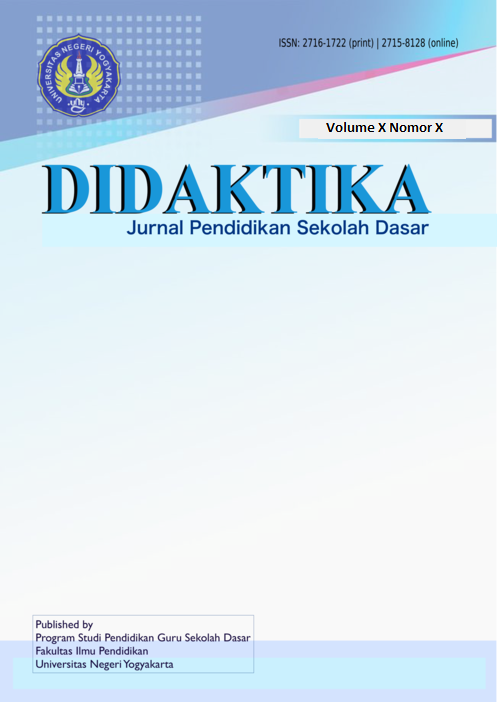Peningkatan Kemampuan Berpikir Kritis Tema Peristiwa dalam Kehidupan Melalui Model Kooperatif Think Pair Share Kelas VA SDN Giwangan
DOI:
https://doi.org/10.21831/didaktika.v1i1.28079Abstract
This research aims at improving the process of learning and improving the critical thinking skill using cooperative learning model type of think pair share at social studies for grade VA student SDN Giwangan. This research was classroom action research which refered to spiral model from Kemmis and Taggart. Data was collected by test and observation. The analize of data used descriptive quantitative. The result shows that cooperative learning type think pair share on social studies can improve the critical thinking skill. This is showed by average scores and mastery learning percentage in pre action, cycle 1, and cycle II. In pre action, average score is 54,81 and mastery learning percentage is 25%. In cycle 1, average score increase to 75,64 and mastery learning percentage increase to 61%. In cycle II, average score increase to 81,61 and mastery learning percentage increase to 77%.
References
Majid. (2013). Strategi Pembelajaran. Bandung: PT Remaja Rosdakarya
Miftahul Huda. (2003). Model-Model Pengajaran dan Pembelajaran. Yogyakarta: Pustaka Pelajar.
Radno. (2004). Melatih Anak Berpikir Analitis, Kritis dan Kreatif. Jakarta: Grasindo.
Sanjaya, W. (2008). Stategi Pembelajaran Berorientase Stanar Proses Pendidikan. Jakarta: Prenada Media Group.
Sapriya & Daris Effendi (ed). (2012). Pendidikan IPS. Bandung: PT Remaja Rosdakarya.
Suwarsih Madya. (2009). Teori dan Praktik Penelitian Tindakan. Bandung: Alfabeta.
Hassoubah, Z. I., & Fata, N. (ed). (2007). Mengasah Pikiran Kreatif dan Kritis: Disertai Ilustrasi dan Latihan. Bandung: Nuansa
Downloads
Published
How to Cite
Issue
Section
Citation Check
License
- Authors retain copyright and grant the journal right of first publication with the work simultaneously licensed under a Creative Commons Attribution License that allows others to share the work with an acknowledgement of the work's authorship and initial publication in this journal.
- Authors are able to enter into separate, additional contractual arrangements for the non-exclusive distribution of the journal's published version of the work (e.g., post it to an institutional repository or publish it in a book), with an acknowledgement of its initial publication in this journal.
- Authors are permitted and encouraged to post their work online (e.g., in institutional repositories or on their website) prior to and during the submission process, as it can lead to productive exchanges, as well as earlier and greater citation of published work.






